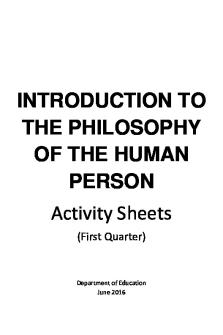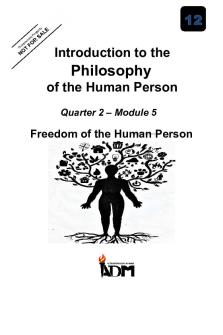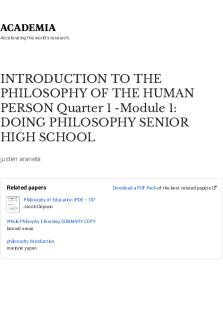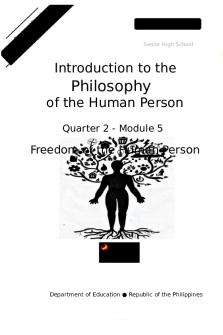Philo Mod1-Q1 Introduction to the Philosophy of the Human Person v3 PDF

| Title | Philo Mod1-Q1 Introduction to the Philosophy of the Human Person v3 |
|---|---|
| Author | BB |
| Course | Speech Communication |
| Institution | Philippine Science High School System |
| Pages | 26 |
| File Size | 1.7 MB |
| File Type | |
| Total Downloads | 95 |
| Total Views | 166 |
Summary
Introduction to thePhilosophy of theHuman PersonQuarter 1- Module 1The Meaning and Method of DoingPhilosophy####### Department of Education ● Republic of the PhilippinesSENIOR HIGH SCHOOLIntroduction to the Philosophy of the Human PersonAlternative Delivery ModeQuarter 1- Module 1: The Meaning and M...
Description
SENIOR HIGH SCHOOL
Introduction to the Philosophy of the Human Person Quarter 1- Module 1 The Meaning and Method of Doing Philosophy
Department of Education ● Republic of the Philippines
Introduction to the Philosophy of the Human Person Alternative Delivery Mode Quarter 1- Module 1: The Meaning and Method of Doing Philosophy First Edition, 2020 Republic Act 8293, section 176 states that: No copyright shall subsist in any work of the Government of the Philippines. However, prior approval of the government agency or office wherein the work is created shall be necessary for exploitation of such work for profit. Such agency or office may, among other things, impose as a condition the payment of royalties. Borrowed materials (i.e., songs, stories, poems, pictures, photos, brand names, trademarks, etc.) included in this book are owned by their respective copyright holders. Every effort has been exerted to locate and seek permission to use these materials from their respective copyright owners. The publisher and authors do not represent nor claim ownership over them. Published by the Department of Education-Division of Misamis Oriental Superintendent: Jonathan S. Dela Peña, Ph.D., CESO V Schools Division Superintendent Development Team of the Module Author: Content Editors: Language Editor: Proofreader : Illustrator/s: Layout Artist: Management Team: Chairperson: Co-Chairperson:
Members:
Lovella D. Tompong Carwin P. Murillo and Ivy O. Niñeza Cynthia M. Garrido Irish Joy Q. Nacua Shem C. Tayanes Jr. and Jayford F. Pajaron Erwin Mark G. Poblete
Jonathan S. Dela Peña, Ph.D., CESO V Schools Division Superintendent Rowena H. Para-on, Ph.D. Assistant Schools Division Superintendent Erlinda G. Dael, Ph.D. CID Chief ES Mary Grace Gallana, EPS I, EsP Celieto B. Magsayo, LRMS Manager Kim Eric G. Lubguban, PDO II Loucile L. Paclar, Librarian II
Printed in the Philippines by Department of Education - Alternative Delivery Mode (DepEd-ADM) Office Address: Masterson Avenue, Upper Balulang, Zone 1, Cagayan de Oro City, Cagayan de Oro, Lalawigan ng Misamis Oriental Telefax: (02) 634 – 1054 or 634 – 1072 E-mail Address: [email protected] / [email protected]
SENIOR HIGH SCHOOL i
Introduction to the Philosophy of the Human Person Quarter 1- Module 1 The Meaning and Method of Doing Philosophy
This instructional material is collaboratively developed and reviewed by Teacher, School Head, Public S l District Supervisor, and Education Program Supervisors of the Dep of Education- Misamis Oriental Division. We encourage teachers a ii er education stakeholders to email their feedback, comments and recommendations to the Department of Education-Misamis Oriental at [email protected]
We value your feedback and recommendations.
Department of Education ● Republic of the Philippines
TABLE OF CONTENTS
Page No. Cover page Table of Contents Overview General Instructions Lesson 1: The Meaning and Method of Doing Philosophy What I Need to Know What I Know What’s In What’s New What Is It? Lesson 1.1 What I Know What’s In Lesson 1.2 What I Know What’s In What’s New What Is It? Lesson 1.3 What I Know What’s In What’s New What Is It? What’s More What I Have Learned What Can I Do Assessment Answer Key References
iv 1 2 3 3 4 4 4 5 6 7 7 8 9 9 10 11 12 12 13 13 14
15 15 16 17 18 19 20
OVERVIEW Hello dear learners! Welcome to this module on Introduction to the Philosophy of the Human Person. This module will help you understand the meaning and process of doing philosophy of the human person as an embodied being in the world and the environment as a means towards a holistic understanding of life. It contains activities that will help you reflects on a concrete experience in a philosophical way and demonstrates various ways of doing philosophy and evaluate opinion. The module is self – instructional and allows you to learn in your own space, at your own pace. So, relax and enjoy learning. To the teacher: This lesson assume that the teacher has already introduced to his/ her learners knowledge about philosophy and its importance as discipline and a means of understanding life. The primary goal of this module is to help learners engaged in some simple activ ities in order to have necessary skills and understanding and reflects on a concrete experience in a philosophical way. To the Learners: At the end of this module, you will be able to reflect on your daily experiences from a holistic point of view and acquires critical and analytical thinking skills so that you can apply this critical and analytical thinking skills to the affairs of your daily life and should be able to demonstrate a capacity for a critical and analytical reflection from the perspective of a holistic and profound vision of life. In order to achieve the objectives of this module, it is necessary to have completed all the module for you to fully understand the activities and discussions. Specifically, this module consists of the following lessons: Lesson 1.1- The Difference Between Holistic Perspective from a Partial Point of View Lesson 1.2 – The Value of Doing Philosophy Lesson 1.3 – Doing a Philosophical Reflection
1
GENERAL INSTRUCTIONS For the learners:
For the teacher:
To be guided in achieving the objectives of this module, do the following:
To facilitate and ensure the students’ learning from this module, you are encouraged to do the following (you may edit this part):
1. Read and follow instructions carefully. 2. Write all your ANSWERS in your PHILOSOPHY ACTIVITY NOTEBOOK. 3. Answer the pretest before going through the lessons. 4. Take note and record points for clarification. 5. Compare your answers against the key to answers found at the end of the module. 6. Do the activities and fully understand each lesson. 7. Answer the self-check to monitor what you learned in each lesson. 8. Answer the posttest after you have gone over all the lessons.
1. Clearly communicate learning competencies and objectives 2. Motivate through applications and connections to real life. 3. Give applications of the theory 4. Discuss worked-out examples 5. Give time for hands-on unguided classroom work and discovery 6. Use formative assessment to give feedback 7. Introduce extensions or generalizations of concepts 8. Engage in reflection questions 9. Encourage analysis through higher order thinking
2 2
Lesson The Meaning and Method
1
of Doing Philosophy
The study of this subject is an initiation to the activity and process of philosophical reflection as a search for a synoptic vision of life. At the end of the course, you should be able to reflect on their daily experiences from a holistic point of view, acquire critical and analytical thinking skills and should be able to apply this critical and analytical thinking skills to the affairs of daily life and become truthful, environment-friendly and service-oriented. Actively committed to the development of a more humane society and articulate their own philosophy of life.
WHAT I NEED TO KNOW?
Objectives: After going through this module, you are expected to understand the meaning and process of doing philosophy, to: 1. Distinguish a holistic perspective from a partial point of view PPT11/12-Ia-1.1 2. Realize the value of doing philosophy in obtaining a broad perspective on life PPT11/12-Ib-1.2 3. Do a philosophical reflection on a concrete situation from a holistic perspective PPT11/12-Ib-1.3
Before heading on to our lesson, let us first check what you already know.
3
WHAT I KNOW? INSTRUCTION: Write your answer in the space provided below. What words come to mind when you hear the word Philosophy? Why do we need to study Philosophy? Philosophy, every time I hear it, the word that quickly comes to mind is belief, the belief that people are having as their way of life. Philosophy often reminds me of the greats, people like Socrates, Plato, Aristotle, and other famous philosophers that shared their wisdom to us. We need to study Philosophy because it is an important is because it makes us think of world, we ask questions about what is truly happening around us and what we have observed. Great job! Later we will see if your answers are correct by reading the rest of this module.
WHAT’S IN?
The word philosophy comes from two Greek words: philos (love) and sophia (wisdom). The ancient Greeks used this term to refer to “love of wisdom” and they soon applied it to the study or discipline that uses human reason to investigate the ultimate causes, reasons, and principles which govern all things. Philosophy is the study of general and fundamental questions about existence, knowledge, values, reason, mind, and language. Philosophy in simple words is a way of thinking about the world, the universe, and society. It works by asking very basic questions about the nature of human thought, the nature of the universe, and the connections between them. The ideas in philosophy are often general and abstract. Philosophy is the study of humans and the world by thinking and asking questions. It is a science and an art. Philosophy tries to answer important questions by coming up with answers about real things and asking "why?" 4
WHAT’S NEW?
Do you know Philosophers- are people who engage in philosophy.
of
some
Greek
Philosophers?
Direction: Identify the following person in the picture below. Write your answer on the space provided below.
http://en.wikipedia.org/wiki
democritus, plato, aristotle, socrates at epicurus
5
WHAT IS IT?
The most notable ancient Greek philosophers are: Pythagoras (570 BCE to 495 BCE)- A mathematician and scientist, he was credited with formulating the Pythagorean theorem. Heraclitus (535 BCe to 475 BCE)- He proposed that everything that exists is based on a higher order or plan which he called logos. Democritus (460 BCE to 370 BCE)- He devoted himself to the study of the causes of natural phenomena. Diogenes of Sinope (412 BCE to 323 BCE)- He was a known advocate of living a simple and virtuous life. Epicurus (341 BCE to 270 BCE)- He believed that philosophy could enable man to live a life of happiness. Socrates (470 BCE to 399 BCE)- He was considered the foremost philosophers of ancient times. He was credited with formulating the Socratic method- means of examining a topic by devising a series of questions that let the learner examine 5 and analyze his knowledge and views regarding the topic. Plato (427 BCE to 347 BCE)- A student of Socrates, he wrote down his mentor’s teaching and incorporated some of his own ideas into them. Plato’s most significant ideas included his Theory of Forms, which proposes that everything that exist is based on an idea or template than can only be perceived in the mind. Plato is also known for his dialectic- a method of inquiry where two opposing ideas are discussed in an attempt to arrive at new knowledge. Plato’s lasting contribution to learning was his founding of the Academy, an institution of higher learning. Aristotle (384 BCE to 322 BCE)- He attended the Academy, and was the prominent student of Plato. For him, all ideas and views are based on perception and our reality is based on what we can sense and perceive. His studies in logic led to the formulation of a formal process of analyzing reasoning which give rise to deductive reasoning-the process by which specific statements are analysed to reach a conclusion or generalization.
6
Lesson
1.1
The Difference Between Holistic Perspective from a Partial Point of View
We have already discussed the meaning of Philosophy from our previous lesson. Now, let us proceed to another topic. Holistic thinking refers to a perspective that considers large-scale patterns in systems. A holistic perspective requires an individual to have an open mindset and ability to get the general sense or impression regarding a situation. Partial thinking focuses on specific aspects of a situation. The partial view is an important component of analytical thinking, as an individual focuses on certain areas or aspects of a problem in order to understand it.
Pretest
WHAT I KNOW?
Direction: Give a brief answer to the following question. Write your answer on the space provided below.
1. Give a situation where you are adopted a holistic view in looking at a problem or situation. I saw two people arguing about a problem about religious affairs on a social media site, I personally did not join the argument but this sparked interest in me because I thought of both sides in their argument and both their points were correct yet they still are having a conflict instead of just resolving the issue.
2. How can having a holistic view help us become better individuals.
Having a holistic view makes us consider all the possibilities of a problem rather than just being narrow-minded about stuff thus not being open to changes and just following what you personally believe. It is healthy to learn to accept criticism and different views because not everyone will truly agree to a single decision or idea.
7
WHAT’S IN
The term "holistic thinking" refers to a big picture mentality in which a person recognizes the interconnectedness of various elements that form larger systems, patterns and objects. Thinking holistically is the opposite of analyzing something, which involves breaking down a larger system into its details. Holistic medicine is a prominent example of holistic thinking. A medical professional who believes in holistic care considers the relationship between the mind, body and spirit. For example, holistic doctors don't just provide patients with medications. Instead, they look at ways to improve life balance and eradicate health problems from their root source, such as high stress or bad nutrition. In philosophy, point of view describes the perception of an event or phenomenon and how exactly it is viewed. Point of view often is shaped by an individual's beliefs or experiences. Though partial thinking is useful, philosophy utilizes holistic thinking in making sense of problems and issues related to the human experience. People tend to apply an analytical perspective when looking at problems or situations. A holistic view gives rise to a more appreciative perspective about life, as we are able to look at life in its totality.
TWO DIFFERENT TYPES OF THINKING
Study.com
8
Lesson The Value of Doing
1.2
Philosophy in Obtaining a Broad Perspective on Life
Why do we philosophize? We all have the potential to philosophize since we have the tendency to wonder and doubt. A philosopher is a good communicator who can clearly and adequately present his or her ideas. Doing philosophy can be applied in day-to-day activities and life perspectives. Because it involves an evaluative process, doing philosophy allows a person to make better decisions and act accordingly to situations with the help of various philosophical skills. On life perspectives, philosophy enables reflective thinking which greatly influences a person’s view of life, challenges, and relationships In doing philosophy, a holistic perspective on the subject is always required. Failure to do so or only using a partial point of view may lead to illogical or incorrect conclusions.
WHAT I KNOW
Direction: Give a brief answer to the following question. Write your answer in space provided below. 1. How can a person benefit from philosophizing? A person can challenge their intelligence or mental capacity when philosophizing because whenever a problem is presented to them, they can think about its truth and answer, thus making them more improve and enhance their capabilities.
2. What are the reasons that compel a person to engage in philosophical thinking? It is the desire to seek for truth or the answers to the unknown. Desire is what moves a person and the mystery that the unknown poses piques the curiosity of people and is what drives them to find their meaning. If there was no problem then
9
WHAT’S IN
Plato traced man’s need to philosophize to his sense of wonder. Whenever we are confronted with an experience, we always wonder how it came about. French philosopher Rene Descartes traced the need to philosophize to doubt. In life, we will be faced with several ideas and arguments which present themselves as “truths”. A critical and questioning perspective is necessary to determine if indeed these ideas or views are correct or true. Swiss-German philosopher Karl Jaspers saw the need to philosophize because of experience. These experiences limit situation, philosophy provides us a means to understand adverse or challenging conditions, and to rise above them and gain new knowledge and perspective.
The need to philosophize is driven by the love for wisdom. To love wisdom is to have an insatiable desire for truth. Philosophy itself is a distinct area of knowledge with its own goals, concerns, and ways of doing things.
https://thefearlesshustle.com/
10
WHAT’S NEW? Direction: Based on the picture below. Identify the branches of Philosophy. Write your answer on the space provided.
PHILOSOPHY
Philosophy has 5 major branches and 16 minor branches. The first major branch is logic and the minor branches that stem from it are Categorical, Propositional, Predicate, and Mathematical. The second major branch is Axiology, and under it is Aesthetics, Ethics, and Politics. History of Politics is the third branch. Its minor branches are Ideas and People. The fourth major branch is Metaphysics, which consists of Phil of Mind, Phil of Religion, Universals, Ontology, and Causality. The fifth and last major branch is Epistemology, and its minor branches are Dogmatism and Skepticism.
WHAT IS IT?
The following are the branches of philosophy that deals with a particular aspect of life or phenomena. Aesthetics is the branch of Philosophy which deals with beauty and what makes things “beautiful”. Logic is branch of philosophy which deals with correct reasoning. Epistemology discusses the nature of knowledge and knowing. Ethics is the branch which deals with moral questions and dilemmas. Political Philosophy studies governments and deals with questions of justice, power and the rights and obligations of citizens. Metaphysics is a branch of philosophy which deals with questions regarding reality and existence. Philosophy of the Human Person-is an area in philosophy that understand the human person from a philosophical perspective.
Lesson
1.3
Doing a Philosophical Reflection on a Situation from Holistic Perspective
Reflection requires a person to be willing to examine one’s thoughts, feelings, and action and to learn more about one’s life and experiences. Human self-reflection is the capacity of humans to exercise introspection and to attempt to learn more about their fundamental nature and essence. Philosophy has an important place in our daily lives. Engaging in philosophical reflection leads to the development of beneficial skills that individuals can apply in everyday situations.
11
WHAT I KNOW
Direction: Give a brief answer to the following question. Write your answer on the space provided below. 1. Have you ever had an experience where reflecting on your actions benefitted you? Yes, for every mistake there is something to learn from it. For example, when I was young I often tripped when I was running because I was very careless, later I reflected on my actions and learned that I nee...
Similar Free PDFs

Introduction to the Human Body
- 9 Pages

The Human Person in Society
- 12 Pages

Trespass to the person Notes
- 6 Pages
Popular Institutions
- Tinajero National High School - Annex
- Politeknik Caltex Riau
- Yokohama City University
- SGT University
- University of Al-Qadisiyah
- Divine Word College of Vigan
- Techniek College Rotterdam
- Universidade de Santiago
- Universiti Teknologi MARA Cawangan Johor Kampus Pasir Gudang
- Poltekkes Kemenkes Yogyakarta
- Baguio City National High School
- Colegio san marcos
- preparatoria uno
- Centro de Bachillerato Tecnológico Industrial y de Servicios No. 107
- Dalian Maritime University
- Quang Trung Secondary School
- Colegio Tecnológico en Informática
- Corporación Regional de Educación Superior
- Grupo CEDVA
- Dar Al Uloom University
- Centro de Estudios Preuniversitarios de la Universidad Nacional de Ingeniería
- 上智大学
- Aakash International School, Nuna Majara
- San Felipe Neri Catholic School
- Kang Chiao International School - New Taipei City
- Misamis Occidental National High School
- Institución Educativa Escuela Normal Juan Ladrilleros
- Kolehiyo ng Pantukan
- Batanes State College
- Instituto Continental
- Sekolah Menengah Kejuruan Kesehatan Kaltara (Tarakan)
- Colegio de La Inmaculada Concepcion - Cebu












